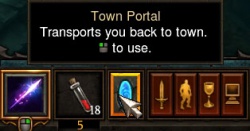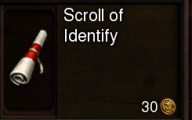Difference between revisions of "Scrolls"
Brokenstorm (talk | contribs) m (→Media) |
|||
| Line 1: | Line 1: | ||
| − | + | Many types of scrolls were present during Diablo III's development, but as of January 2012, late in the beta test, all scrolls have been removed, though some may return post-release, in rebalanced form. | |
| − | |||
| − | |||
| − | |||
| − | |||
| Line 9: | Line 5: | ||
[[File:Scroll-id1.jpg|frame]] | [[File:Scroll-id1.jpg|frame]] | ||
| − | [[Identify Scroll]]s | + | [[Identify Scroll]]s were present during the entire development cycle until they were removed late in beta testing. The announcement was made by Jay Wilson in January 2012.[http://diablo.incgamers.com/blog/comments/diablo-3-progress-report-2#more-12130] |
| − | + | The scrolls were replaced by an inherent identification function; players need merely right click on an unidentified item and after a two-second casting time, the item identifies itself. | |
| − | + | Identification became much less important during development, when blue (magical) items were changed to '''not''' require identification. Only yellow (rare), green (set) and orange (legendary) items must be identified. | |
| − | + | Unlike in Diablo 1 and Diablo 2, [[Deckard Cain]] was never a source of item identification in Diablo 3. The [[Mystic]] was, when she and the other [[Artisans]] were first revealed, though she lost that knack during development, and was ultimately removed from the game entirely. | |
| Line 21: | Line 17: | ||
[[File:Scroll-wealth1.jpg|frame]] | [[File:Scroll-wealth1.jpg|frame]] | ||
| − | [[Scroll of Wealth]] was | + | The [[Scroll of Wealth]] was removed from the game during development, and replaced by the [[Cauldron of Jordan]], an interface item that allowed players to sell items from anywhere in the dungeons. This item was removed late in the beta test, as the developers felt it was too convenient and an exploit, as it along with the (also removed) [[Nephalem Cube]], made things too easy and destroyed a sense of game flow by enabling players to never return to town. |
| + | |||
| + | |||
| + | ==Scroll of Town Portal== | ||
| + | |||
| + | [[File:Town-portal-belt1.jpg|thumb|250px|Town Portal on the [[belt interface]].]] | ||
| + | [[Town Portal]]s changed form and status in Diablo III repeatedly during development. Initially the scrolls were just as they were in Diablo II; objects that opened a blue portal in the dungeon. After some testing these were removed as the developers felt they were too easily exploited to escape from dangerous situations. Players were expected to use the frequent [[waypoint]]s for town travel, and various traveling [[NPC]] merchants and other conveniences were added to allow selling in the dungeons. | ||
| + | |||
| + | This theory changed during development, when the [[Stone of Recall]] was added to the game. This interface object allowed for a return to town from any dungeon location, but came with a five second casting time, and no longer created a portal in the dungeon; the character was instead teleported back to town, where a blue portal appeared for traveling back to the dungeon. | ||
| + | |||
| + | This feature evolved back into a Town Portal that was housed directly on the belt interface, after the Stone of Recall was removed during late beta testing. | ||
| + | |||
| + | |||
| + | ==Scroll of Companion== | ||
| + | |||
| + | [[File:SoCicon.jpg|frame]] | ||
| + | The [[Scroll of Companion]] was removed from the game during the beta test. When functional, it allowed characters to summon a small animal or insect pet that would scurry or fly around, picking up all of the stacks of gold that dropped from monsters, chests, destructibles, and all other sources. | ||
| + | |||
| + | It was a very convenient feature, but it proved so useful that it become almost mandatory, which the developers didn't like. There were also some debates over the thematic appropriateness of some of the cute and fuzzy pets. | ||
| + | |||
| + | This feature may well return post-release, if the developers can find a way to make it less than mandatory. | ||
| − | |||
| − | + | ==Scrolls of Reforging== | |
| − | + | The various types of [[Scrolls of Reforging]] will not be included in the release version of Diablo III, but may return in a patch or an expansion, if the developers can balance them to their liking. | |
| − | + | These scrolls were never usable in the beta, but were in the game code and even on Blizzard's site, for some time. They allowed a character to reroll the stats on an item, much as some of the {{iw|Horadric_Cube_recipes cube recipes}} did in Diablo II. There were three qualities of this scroll, themed to work on rare, set, and legendary items. | |
| − | See the [[ | + | See the [[Scroll of Reforging]] article for full details. |
| − | == | + | ==Scroll of Greed== |
| − | + | This item is seen in the game code, but has never been enabled or officially commented on. | |
* Scroll of Greed: Shows treasure on map. | * Scroll of Greed: Shows treasure on map. | ||
''The power locked within each treasure of antiquity is far too valuable to squander.'' | ''The power locked within each treasure of antiquity is far too valuable to squander.'' | ||
| − | |||
| − | |||
| − | |||
| − | |||
| − | |||
Revision as of 22:34, 27 January 2012
Many types of scrolls were present during Diablo III's development, but as of January 2012, late in the beta test, all scrolls have been removed, though some may return post-release, in rebalanced form.
Contents
Scroll of Identify
Identify Scrolls were present during the entire development cycle until they were removed late in beta testing. The announcement was made by Jay Wilson in January 2012.[1]
The scrolls were replaced by an inherent identification function; players need merely right click on an unidentified item and after a two-second casting time, the item identifies itself.
Identification became much less important during development, when blue (magical) items were changed to not require identification. Only yellow (rare), green (set) and orange (legendary) items must be identified.
Unlike in Diablo 1 and Diablo 2, Deckard Cain was never a source of item identification in Diablo 3. The Mystic was, when she and the other Artisans were first revealed, though she lost that knack during development, and was ultimately removed from the game entirely.
Scroll of Wealth
The Scroll of Wealth was removed from the game during development, and replaced by the Cauldron of Jordan, an interface item that allowed players to sell items from anywhere in the dungeons. This item was removed late in the beta test, as the developers felt it was too convenient and an exploit, as it along with the (also removed) Nephalem Cube, made things too easy and destroyed a sense of game flow by enabling players to never return to town.
Scroll of Town Portal

Town Portals changed form and status in Diablo III repeatedly during development. Initially the scrolls were just as they were in Diablo II; objects that opened a blue portal in the dungeon. After some testing these were removed as the developers felt they were too easily exploited to escape from dangerous situations. Players were expected to use the frequent waypoints for town travel, and various traveling NPC merchants and other conveniences were added to allow selling in the dungeons.
This theory changed during development, when the Stone of Recall was added to the game. This interface object allowed for a return to town from any dungeon location, but came with a five second casting time, and no longer created a portal in the dungeon; the character was instead teleported back to town, where a blue portal appeared for traveling back to the dungeon.
This feature evolved back into a Town Portal that was housed directly on the belt interface, after the Stone of Recall was removed during late beta testing.
Scroll of Companion
The Scroll of Companion was removed from the game during the beta test. When functional, it allowed characters to summon a small animal or insect pet that would scurry or fly around, picking up all of the stacks of gold that dropped from monsters, chests, destructibles, and all other sources.
It was a very convenient feature, but it proved so useful that it become almost mandatory, which the developers didn't like. There were also some debates over the thematic appropriateness of some of the cute and fuzzy pets.
This feature may well return post-release, if the developers can find a way to make it less than mandatory.
Scrolls of Reforging
The various types of Scrolls of Reforging will not be included in the release version of Diablo III, but may return in a patch or an expansion, if the developers can balance them to their liking.
These scrolls were never usable in the beta, but were in the game code and even on Blizzard's site, for some time. They allowed a character to reroll the stats on an item, much as some of the cube recipes did in Diablo II. There were three qualities of this scroll, themed to work on rare, set, and legendary items.
See the Scroll of Reforging article for full details.
Scroll of Greed
This item is seen in the game code, but has never been enabled or officially commented on.
- Scroll of Greed: Shows treasure on map.
The power locked within each treasure of antiquity is far too valuable to squander.
Media
Images of scrolls, as seen in Diablo III, some of which are outdated.
| Items of Diablo III [e] Item Basics Normal Items Crafting Legendary Armor I Legendary Armor II Legendary Weapons 1h Legendary Weapons 2h Item Sets |
|---|



